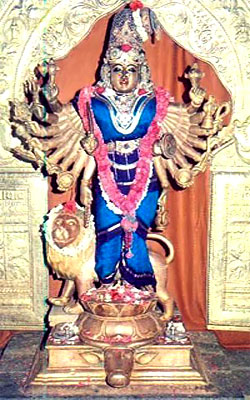 Chandi fable commences with the story of Kalketu. Kalketu is a young hunter of low caste whose wife was Phullara. They were a poor but a good couple. Goddess Chandi decided to announce her greatness to the world through this couple. She assumed the form of a golden hue lizard which Kalketu captured and took home. The goddess changed herself into a young beautiful woman and told Kalketu and Phullara that she was a rich woman who left her old husband. She was attracted to Kalketu and wished to live with him and if they let her stay she would make her rich.
Chandi fable commences with the story of Kalketu. Kalketu is a young hunter of low caste whose wife was Phullara. They were a poor but a good couple. Goddess Chandi decided to announce her greatness to the world through this couple. She assumed the form of a golden hue lizard which Kalketu captured and took home. The goddess changed herself into a young beautiful woman and told Kalketu and Phullara that she was a rich woman who left her old husband. She was attracted to Kalketu and wished to live with him and if they let her stay she would make her rich.
The Goddess wanted to test the virtue of the couple. Phullara felt miserable at the prospect of losing Kalketu`s love and instead urged the goddess to go back to her husband. Kalketu also urged her to do the same. The goddess was impressed and gave a ring of great value. The ring was sold and with the money he built a great town named Gujarat and founded a kingdom. Bharu Datta was a fraud who was influenced by Kalketu. He oppressed the king`s subjects thereby being relieved of office and banished. Bharu Datta instigated the neighbouring king of Kalinga to invade Gujarat. Kalketu was captured, imprisoned and tortured. However he prayed to Goddess Chandi. The goddess appeared in a dream to the king of Kalinga and ordered him to release Kalketu. Thereafter they lived happily for many years on earth and went to heaven.
Khullana is the heroine of the second fable who was the young and beautiful daughter of a rich merchant of Ichhaninagar. Her cousin Lahana was the wife of Dhanapati who is a wealthy merchant of Ujaninagar. Lahana and Dhanapati were middle-aged and had no children. Dhanapati was a pleasure-loving man who was fond of the pastime of pigeon flying. One day his pigeon was being pursued by a hawk who took shelter with Khullana. When he went to recover it Dhanapati fell in love with the girl. He married her though he had to leave home soon after on an errand of the king. Lahana in absence of Dhanapati following the advice of the wicked maid-servant Durbala, maltreated Khullana. The girl was ill fed, ill clothed and made to tend goats in the fields. She amidst this worshipped Chandi. When her husband returned her happy days returned but it was brief as Dhanapati had to leave home again to bring some merchandise from Simhal. Khullana was pregnant when he went.
On the sea near Simhal Dhanapati saw a young beautiful woman sitting on a lotus on the waves of the sea and swallowing an elephant. He was unaware of this vision of the Kamale Kamini or Lady on the Lotus that had been granted to him by Goddess Chandi in her desire to make him her devotee. He narrated this to the king of Simhal but the king did not believe him. Dhanapati agreed to spend the rest of his life in prison if he failed to show it to the king. Dhanapati and the king went to the spot but there was nothing to be seen and he was imprisoned.
Khullana gave birth to a son in Ujaninagar whom she named Sripati. When he grew up he sailed for Simhal in search of his father. At the same spot he saw the same wonder that his father had seen. He told the king of Simhal and he agreed to forfeit his life if he could not prove it. So the king went with Sripati to see it but there was nothing and Sripati was sentenced to death. However Goddess Chandi rescued both father and son. The king of Simhal gave his daughter in marriage to Sripati. Dhanapati returned home with his son and daughter-in-law.













